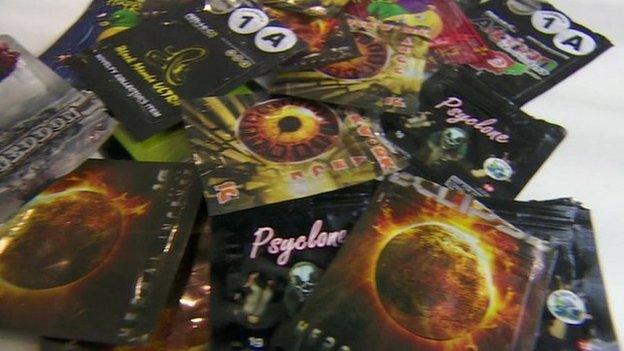Call to halt legal highs ban based on 'flawed' Irish system
- Published
David O'Leary said that using the drug Clockwork Orange had made him feel "dead inside"
The UK government is being urged to put off a ban on so-called legal highs after claims similar legislation in the Republic of Ireland is flawed.
Ministers are due to publish draft laws modelled on Irish legislation introduced in 2010, with prison sentences of up to seven years.
However, a senior Irish drugs officer has admitted the law can leave police powerless to prosecute.
The Home Office said the UK system would be "flexible and proportionate".
The Irish Psychoactive Substances Act says it is illegal to buy or sell substances that are "psychoactive".
But a BBC investigation has found that Ireland's drugs squad is unable to act against a range of legal-high type drugs because of problems with the legislation.
To bring a prosecution, police must scientifically prove that a substance has a psychoactive effect. So far, there have been only four successful prosecutions in five years.
One form of synthetic cannabis linked to a number of deaths is being openly traded in some Irish towns, obtained on the internet and marketed as Clockwork Orange or Happy Joker. It costs about 10 euros a gram, or £10 a gram in the UK.

What are synthetic cannabinoids?
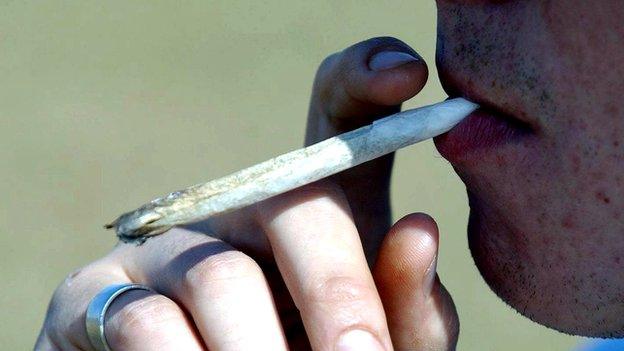
Synthetic cannabinoids are chemicals that act like the active part of cannabis, a substance called tetrahydrocannabinol (THC)
Side effects can include an elevated heart rate, sickness, and hallucinations
They are usually sold in 'herbal' smoking mixtures
Source: Frank, external

One of Ireland's top drug squad officers, Det Sgt Tony Howard from the Drugs and Organised Crime Bureau, said: "Unfortunately a prosecution cannot be taken."
"There are problems. It's not perfect legislation."
Police scientists have examined samples of the drugs but have so far been unable to prove that they are technically "psychoactive", he said.
"We are relying on scientists to assist us with these prosecutions and, unfortunately, they haven't been able to provide the evidence to us."
The admission has prompted calls for the UK Home Office to postpone similar legislation in Britain.
'Dirty drug'
"The comments raise serious doubts about the likely consequences of the government's legislation," said Baroness Meacher, chair of the All-Party Parliamentary Group on Drug Reform.
"I believe that, given these concerns, the government should pause the bill and call for a full impact assessment of the Irish psychoactive substances ban".
Despite Ireland's ban on legal-high type drugs, two young men on one estate in Monaghan recently died after using the synthetic cannabis.
"It killed them. It killed both of them," synthetic cannabis addict David O'Leary said.
"It killed my brother Michael in December and it killed my best friend two months before that. He took his own life."
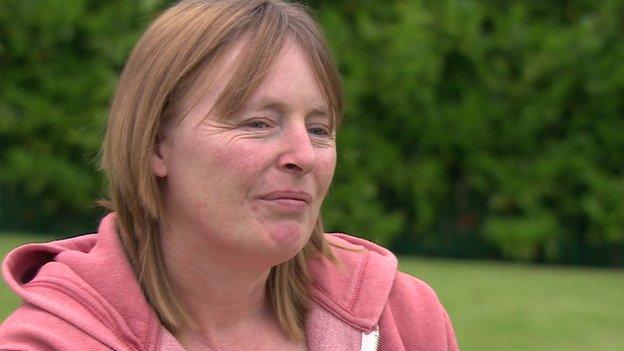
Sharon McQuaid, whose son died after becoming addicted to synthetic cannabis, said police turn a "blind eye"
David is also addicted to the drug, which he describes as more addictive and dangerous than heroin.
"It's a dirty, dirty drug. You want to cut yourself to pieces or cut your throat or hang yourself.
"Last week I had a plan to hurt my own brother. I had a plan in my head to get up and stick a knife in his stomach and twist it because he had money and I hadn't."
A public meeting was called after the body of one young man, PJ McQuaid, was found hanging from a tree in the middle of the Monaghan estate last October. He had been trying to beat his addiction to the synthetic cannabis.
The meeting turned angry after the local police chief explained that, even with the blanket ban on psychoactive drugs, Clockwork Orange was legal and his officers could do little to stop it.
"I blame the Garda (Irish police)," PJ's mother Sharon McQuaid said.
"They know who the dealers are but they just turn a blind eye."
Det Sgt Howard said the police had interviewed a number of people, but had to "act within the legislation that we have".
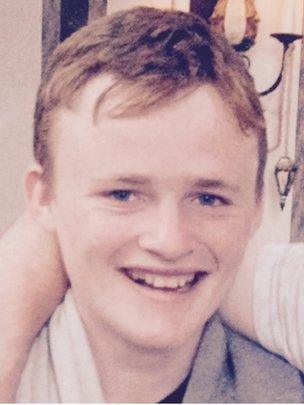
PJ McQuaid had been battling his addiction to synthetic cannabis before he died
"I am aware of those cases where unfortunately we have had fatalities," he added.
A local community worker says whole families are addicted to the legal-high type drugs, empty packets are scattered like leaves across the Mullaghmatt estate.
"It is an epidemic, that's what it is," Packie Kelly said.
"The legislation doesn't seem to be working here. The availability of it seems to be endless. It's as easily got now as cigarettes."
Most of the supplies of the drug are obtained via the internet. David O'Leary says a large delivery arrived in Monaghan last week.
'In every town'
"It comes in a box and you open the door and sign for it and the smokes are in your hand. And that's it."
Another young man from a different Irish town had a similar story: "It is in every town. There's loads of it online," he said.
"One time it did my head in that much I took an overdose and ended up in hospital. I very nearly died."
A blanket ban on legal highs, which are often sold online or on the High Street, was in the Conservative Party's election manifesto and featured in the Queen's Speech.
The Psychoactive Substances Bill will apply to "any substance intended for human consumption that is capable of producing a psychoactive effect", the government has said.

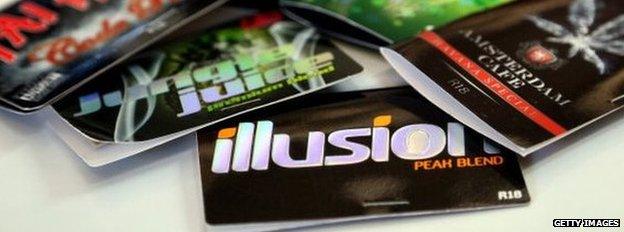
There is currently no blanket ban on the sale of legal highs, also known as new psychoactive substances
Legal highs are psychoactive drugs that contain various chemical ingredients, some of which are illegal while others are not
They produce similar effects to illegal drugs like cocaine, cannabis and ecstasy
They are sold in a variety of forms, including powder, pills, liquids, capsules, perforated tabs and smoking mixtures
The substances are often sold in "head shops" alongside drug paraphernalia

Alcohol, tobacco and caffeine will be excluded, and there are also exemptions for food and medical products, while controlled drugs will continue to be regulated by existing laws.
Home Office Minister Lord Bates recently confirmed that the proposals are based on Ireland's legislation.
"As with the legislation in the Irish Republic, we have designed the enforcement framework so that the police, local authorities and other law enforcement agencies can adopt a flexible, proportionate response," he told the House of Lords.
Some brands of synthetic cannabis have already been classified as Class B drugs in Britain under the Misuse of Drugs Act, but the government says the blanket ban on all psychoactive substances is required to deal quickly with new products as soon as they emerge.
"We need a system that is nimble enough to be able to nip problems in the bud before they escalate," Lord Bates explained.
An amendment to the legislation has now been tabled calling on the UK home secretary to "conduct an impact assessment" of Ireland's Psychoactive Substances Act before the blanket ban is introduced.
- Published29 May 2015
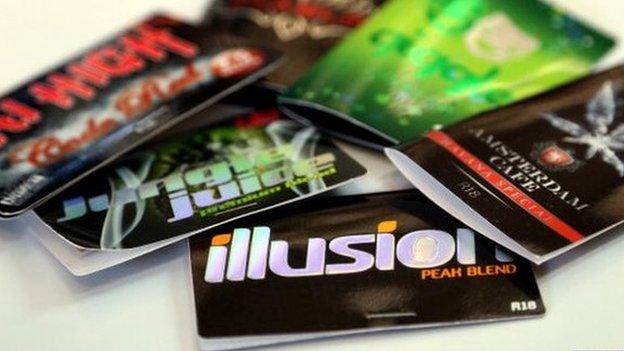
- Published29 May 2015
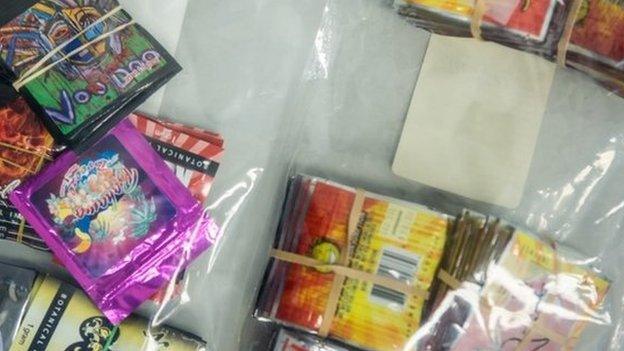
- Published15 June 2015
